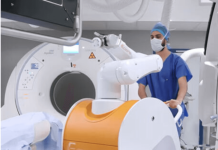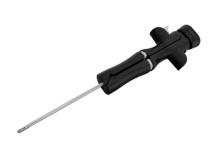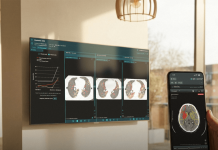Monogram Technologies announced that surgeons completed a landmark robotic knee replacement procedure.
The company — set to be acquired by Zimmer Biomet — said that, on July 26, the first-ever fully autonomous, saw-based robotic knee replacement procedure took place on a live patient. It took place at the Krishna Shalby Hospital in Ahmedabad, India, as part of a multi-center clinical trial.
Related: CorTec announces first human implant for its BCI system
Monogram partnered with Shalby to evaluate the safety and effectiveness of the mBôs total knee arthroplasty (TKA) system. The study utilizes the Consensus CKS implant, which is substantially equivalent to the Monogram mPress implants for regulatory purposes. The trial includes 102 total knee replacement procedures. It has a three-month clinical follow-up conducted across multiple sites in India.
The company in March received FDA 510(k) clearance for its mBôs total knee arthroplasty (TKA) system. It designed mBôs to deliver safety, efficiency and accuracy in robotic-assisted TKA. It says it engineered mBôs with scalability in mind, with plans to eventually support more orthopedic applications.
mBôs, a CT-based, semi-autonomous system, delivers AI-navigated TKA. Zimmer Biomet expects to bring it to market with its own implants in early 2027. Additionally, Monogram has a fully autonomous version under development.
“The first fully autonomous knee replacement on a live patient using Monogram’s TKA System is a tremendous milestone for the company,” said CEO Benjamin Sexson. “The system appears to have flawlessly executed the plan based on intraoperative surgeon evaluation, including intraoperative laxity estimation and achievement of planned alignment. I believe Monogram’s product will have a significant positive impact on the standard of care for orthopedic medicine in the years to come.”




